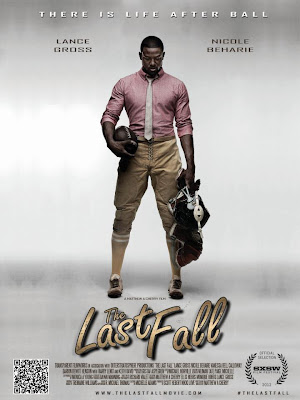That last point underscores just how well that opening stat sets the stage for the film beyond a simple plot application. If there is one unifying thread for the entire film, it's neither football nor sports in general, but the shattering of illusions. In terms of the characters of that come into Kyle's orbit and the viewing audience itself, Cherry debunks the widely held notion that all pro athletes have wealthy livelihoods and lead glamorous lives; Kyle's situation reflects the workaday majority for whom playing sports for a paycheck is a dream but, at the end of a day, a job. That reality is the crux of Kyle's predicament: he had a dream, worked his entire life to achieve it, and accordingly was blessed to live it, albeit not in exactly the most idealized fashion. But generally no one ever comes to think about needing to do anything after the dream, and having been so identified by it for so long--by others and himself--Kyle falls into a state of limbo even more internal than external, confronted with the task of once and for all defining himself apart from what it is that he does.
Cherry doesn't follow the obvious nor easy directions that would follow that set-up. The return home would suggest a clichéd "rejuvenating rediscovery of roots" arc, but going back proves to be a necessary step not so much to regress back to basics than to witness how those close to him have been able to progress and evolve beyond what had been familiar to him. His mother is living the active dating life of a mature single woman; his kid sister (Yaani King) is in the growing pains of becoming a young adult; and, to his greatest surprise, Faith Davis (Nicole Beharie), the high school sweetheart he abandoned in favor of gridiron glory, is now a single mom. The reconnected relationship between Kyle and Faith best exemplifies Cherry's sensitive, complex, and realistic approach to the film as a whole. While there is that genuine warmth and affection that comes with longtime familiarity, there's also a certain tentativeness, particularly on her end. Not only is she in a different space in her life, she is secure in that--and with the recognition and understanding that he is not in his own similar place of security, she can enjoy these new moments with him for what they are, without any grand expectations. For Kyle, his desire to make amends and start anew with her is complicated, if not contradicted, by his continued expectation that the dream of the pro baller can and will still continue.
That sense of suspended animation appropriately informs Cherry's approach to the entire film. It's a very introspective story for all of the characters, and accordingly the pace is fairly slow and the tone is generally quite subdued. With histrionics kept to a minimum--even in the comparatively bigger dramatic moments--it is that much more up to the actors to engage the audience, and Cherry's trust in them proves to be well placed. Gross displays a heretofore unseen depth and piercing subtlety to match his natural charisma, Kyle's existential anguish vividly coming through in his expressive stillness. Every bit his match is the luminous Beharie, whose Faith is equal parts romantic vulnerability and intelligent, independent strength; their chemistry is all the more believable and affecting because it is so effortless and elegantly understated. That also applies to all those surrounding them, to whom Cherry is generous enough to give moments to shine, whether they be key supporting players such as Calloway and Keith David as Kyle's parents or a briefly seen football contemporary of Kyle's (Sinorice Moss), who has a disarming scene that poignantly reflects not only Kyle's situation but more or less that of anyone simply trying to do their best for themselves and their loved ones.
And that's where Cherry excels with The Last Fall: placing the viewer intimately into the mind and heart of its protagonist and painting an equally detailed and absorbing portrait of his life and those who inhabit it. If there is some awkwardness in the more plot-driven mechanics, such as some contrivances involving Faith's son's father (Darrin Dewitt Henson, doing good work in the story's weakest element) and some exposition that is not always the most gracefully integrated into the fabric of the dialogue, the film more than compensates with the richness of its characterization and Cherry's distinct, assured voice--one that will surely be heard even more loudly in the years to come.
Buy the The Last Fall DVD here.
Buy the The Last Fall soundtrack here.
Buy the The Last Fall score here.




